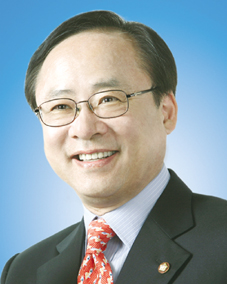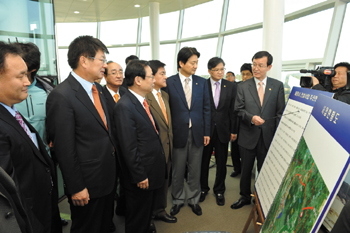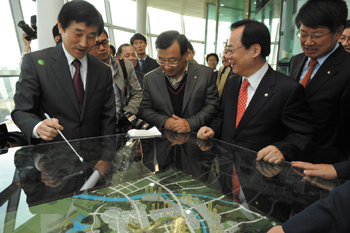Serious Scrutiny of Budget
Chmn. Lee determined to scrutinize budget with bi-partisan cooperation
 Rep. Lee Ju-young, member of the Legislature and the Judiciary Committee and chairman of the Special Committee for Budget and Accounts has the crucial job of chairing the parliamentary deliberation of the proposed national budget. He recently toured various government-run research institutions like the Korea Nuclear Research Institute and Kangcheonbo in Yeoju, Gyeonggi Province, where a number of weirs are being built under the Four Rivers Restoration Project, designed to prevent flood damage and to improve the scenery along the four largest rivers in Korea.
Rep. Lee Ju-young, member of the Legislature and the Judiciary Committee and chairman of the Special Committee for Budget and Accounts has the crucial job of chairing the parliamentary deliberation of the proposed national budget. He recently toured various government-run research institutions like the Korea Nuclear Research Institute and Kangcheonbo in Yeoju, Gyeonggi Province, where a number of weirs are being built under the Four Rivers Restoration Project, designed to prevent flood damage and to improve the scenery along the four largest rivers in Korea.
Lee and opposition and ruling party legislators including Reps. Lee Jong-koo, Lee Jeong-hyun and Suh Kap-won, among others, made the trip to fulfill the need for an on-the-spot inspection in relation to the parliamentary budget deliberation. They wanted to make sure they knew firsthand how the budget allocations were being spent and to prevent any waste. They heard from Commissioner Han Man-hee of the Happy City Construction Agency on the progress of the Sejong City construction and Deputy Minister Shim Myung-pil in charge of the Four Rivers Restoration Project on the progress of the project so far during their tour. Following is what he had to say in the interview:
Question: Can you please explain to us the significance of your on-the-spot inspection and deliberation of next year¡¯s budget by the special committee?
Answer: Since it was a day trip, we had to start early in the morning, at 7:30, from the National Assembly. We traveled to the Kangchoenbo in Yeoju, part of the Four Rivers Restoration Project, and then to the Daeduk Research Complex in Daeduk, South Chungcheong Province, to inspect five research institutes there including the Korea Nuclear Research Institute. We also visited Sejong City to see how the work on buildings to house 12 central administration units, including the Prime Minister¡¯s Office, to be relocated to the new city is going as scheduled. We finally traveled to Iksan, North Jeolla Province, to have a look around at the national food industry cluster.
We made the trip to help us in our deliberations of the proposed national budget, since it confirms how the budget is spent at the jobsites. We get many requests for more budget allocations, but on-the-spot inspection is necessary to prevent the budget deliberation from becoming just another issue discussed at the table.
Q: Can you tell us in what direction the budget deliberation for the 2011 national budget is going?
A: Even allocation and appropriateness are the basic principles of budget deliberation. We have to check if the economically isolated people are to be well taken care of in terms of their welfare, and if budget allocations will go to areas that don¡¯t really need them or if they are being wasted. We have to go a long way to make sure that the budget deliberation is completed based faithfully on those principles.
We have the duty to refill the national treasury, which was depleted in the past year to overcome the economic crisis, in our deliberation of the proposed budget. We have to see if the government has intentions to secure financial stability and soundness.
I will try to lead the committee in a fair and neutral way so that the budget is passed with both the ruling and opposition parties settling their differences, especially in the allocation of funds to such key national projects as the Four Rivers Restoration Project without too much heated argument during the committee¡¯s budget examination process.
Q: With regard to the budget allocation for the Four Rivers Restoration Project, which is opposed by non-government parties, can you please tell us where both ruling and opposition parties stand on their talks to settle differences and what to expect down the road?
A: The project has not yet been discussed in the committee so far, except that both the ruling and opposition parties have been at it in the media. I don¡¯t think it is the right time yet for the committee to take on the matter.
As you know, the major opposition Democratic Party legislators have been talking to the media about their opposition to the major project to overhaul the four major rivers. But the committee has yet to make comments on the budget and it is inappropriate to talk about the budget yet. It still is the time to have our ears open to listen to what they have to say about the budget and when the committee takes up the budget deliberation I plan to look for areas where agreement can be reached by all members of the committee representing both sides of the aisle.
Q: Your tour included a stop in Sejong City. What were some of the most important matters in your tour of the new city?
A: In the city, we wanted to see if construction was on schedule for the various buildings, such as those for the Prime Minister¡¯s Office, the Ministry of Strategy and Finance and the Ministry of Land, Transport and Maritime Affairs. Twelve government ministries in all are scheduled to move to the city in 2012. We also wanted to see what budget allocations are needed for the project next year to meet the schedule.
Q: You had a session with five research institutions in the Daejeon City area including the Korea Nuclear Research Institute and the Korea Aviation and Space Research Institute during your trip. Can you please explain to us your ideas in deliberation of the national budget related to the development of a country strong in R&D and technology?
A: In a word, the R&D budget is a key matter that the nation¡¯s future is dependent on and is also a crucial area of which the national treasury should take charge.
The R&D budget for 2011 is set at 14.87 trillion won, up 1.172 trillion won or 8.6 percent from this year, which is 3 percent more than the general increase rate for the national budget for 2011. It has been rising 10 percent on average in recent years. The R&D budget outlay includes funding for research in the basic and core areas, which is up the most from last year at 46.2 percent, consists of allocations for such areas as the reduction of greenhouse gas emissions, climate change and low-carbon, green growth areas where Korea can achieve early world dominance as well as in the area of software development. The budget also includes allocations to R&D for the creation of jobs.
The most problematic area in the R&D budget has been linking the R&D products with industrial uses. We ought to look seriously into the matter during the budget deliberation, as no matter how good the research, it won¡¯t be valuable unless it is successfully utilized and commercialized by industry.
Q: Can you please enlighten us with you ideas on strengthening the soundness of the nation¡¯s financial health and the current status of national debts and those government financial risks not seen as state debts?
A: State debts this year will rise to around 407.6 trillion won, 36.1 percent of GDP. According to the national treasury management plan, the state financial conditions will improve gradually and by 2014 the debt level will be down to 31.8 percent of GDP, the level maintained in 2009, with the government¡¯s finances returning to the black in the amount of 200 billion won, although it is not large enough.
As you said, there are state financial factors that are not understood as state debts, but have been a burden on government finances. In particular, debts incurred by state-run companies such as LH Corp., whose financial conditions have gotten worse with the construction industry going through a slump. Financial conditions of other state-run companies have been getting worse. I expect they will be able to return to normal, as the government has been trying to help them through various means, including restructuring, management reform and privatization.
In the budget plan for next year, there are measures for those debt-ridden government-run firms to improve their operations including sunset support funds, strengthening the management of retirement funds. During the budget deliberation, we will be looking into those measures in detail and will come up with additional means to strengthen those supplementary plans if needed.
Q: Can you tell us your ideas to improve the budget deliberation system. You, the chairman of the committee, have already called for an extension of the budget deliberation period to strengthen the budget deliberation rights of the National Assembly. You also proposed the earlier government audit and closure of budget accounts to take place in June and operate the regular National Assembly sessions as a government budget deliberation session.
A: Really, the current practice to deliberate the budget in 90 days was introduced in the Yushin Constitution during the late-President Park Chung-hee administration when the parliament was regarded as the legislative ministry. The 3rd Republic that preceded the Park Chung-hee government stipulated that the government should submit its budget to the parliament on Sept. 1, while many foreign countries guarantee a period of 120 days for deliberation of their budgets in the parliament.
However, it is hard to remove various concerns for the efficient deliberation of the budget by the National Assembly. During the regular session, the parliament should take care of the expenditure accounts of the budget by the administration. When the regular session of the parliament starts, legislators are occupied with government audit and the deliberation of proposed laws.
In the regular session, they have many key issues to take care of including accounts closure, government audit and the deliberation of the budget, and I feel that we need more time to examine a national budget as large as 300 trillion won by improving the system for budget examination by the parliament. nw
Rep. Lee Ju-young, chairman of the Special Committee for Budget and Accounts of the National Assembly.
Rep. Lee Ju-young, chairman of the Special Committee for Budget and Accounts of the National Assembly, looks over a Sejong city construction site from the Milmaro Observatory with committee members, including Rep. Lee Jong-gu, Rep. Lee Jung-hyun, Rep. Suh Kap-won and Senior Staff Director Joo Young-jin of the National Assembly.
3Fl, 292-47, Shindang 6-dong, Chung-gu, Seoul, Korea 100-456
Tel : 82-2-2235-6114 / Fax : 82-2-2235-0799